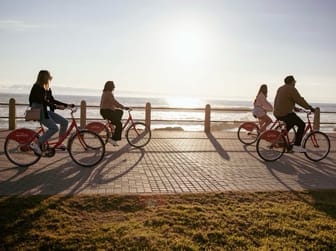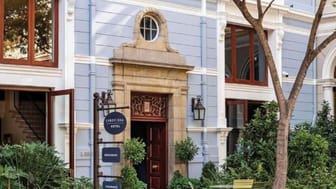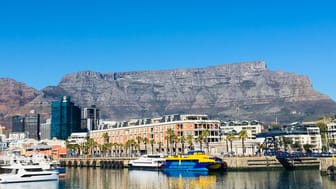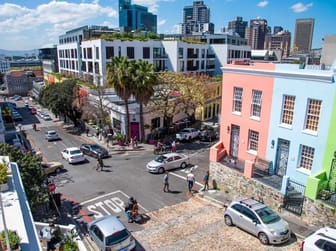Cape Town Travel Guide

Cape Town is a modern, cosmopolitan city surrounded by nature. Centred around Table Mountain, one of the New 7 Wonders of the world, the Mother City is known for its beautiful beaches, stunning biodiversity, award-winning food and wine, and sheer variety of experiences on offer.
The Basics
- Currency: South African Rand
- Currency Sign: R
- Time Zone: GMT+2
- Languages: English, Afrikaans and Xhosa
- Driving: Left-hand side
- Measurement: Metric
- Tipping: 10% of the total
Best time to visit
January and February (Recommended)
January is one of Cape Town’s busiest months. It’s usually hot and sunny, and there are loads of events to attend.
By February, things have calmed down a little, but it’s still quite busy.
Cape Town has a Mediterranean climate, which means that it gets its rainfall in the winter months, so January & February are mostly dry.
November and December
During the summer months toward the end of the year, Cape Town comes to life.
By December, things are in full swing and it’s the most festive time of the year by far. The wind picks up in the summer months, but this is also the time you’ll find picture-perfect summer days.
March and April
During March and April, there are several big events, including the Two Oceans Marathon, the Cape Town Cycle Tour, and Easter Weekend, which bring in quite a few local and international tourists.
Temperatures are still pleasing in March, although April can start to get cooler.
September and October
September marks the start of spring in Cape Town. This is the perfect time for whale-watching and the famous wildflowers.
The rain eases up a little, and the temperature starts to rise.
Getting around
From the Airport
The best option is taking an Uber or a shuttle, although a shuttle service is more expensive than Uber.
Car
If you want to visit places inaccessible by public transportation or a tour, renting a car is the best option. Note that finding parking can be difficult and is mostly street parking. Please don't leave valuables in the car or within sight to avoid your car being broken into.
Uber
This is the most convenient option for getting around. It can become costly if used all the time and for longer distances.
MyCiti Bus
This is the cheapest option if you don't want to walk everywhere.
Train
There are a few train routes, but the most popular route is the Southern Line to Fish Hoek.
Bicycle Rental
You can pedal along the Promenade to the shopping and dining mecca of the Waterfront, into the world-class eco-hub at the Green Point Park and Cape Town stadium precinct, or explore the CBD.
Walk
If you don't mind walking, you will be able to walk everywhere in Green Point, Sea Point, V&A Waterfront, and even Clifton.
Best areas to stay
Sea Point
Sea Point is centrally located if you want to be close to the best beaches, not too far from the V&A Waterfront, and within easy reach of the city centre. Sea Point has stunning views of the ocean and Lion’s Head.
There are plenty of restaurants and grocery stores to choose from. Walk to the Sea Point Promenade, which stretches from the end of Sea Point to Mouille Point, located close to the V&A Waterfront.
Hop on the MyCiti bus, grab an Uber, or even walk (for breathtaking views) to Clifton Beach. Have a picnic, grab a coffee, or wander around Green Point Park. The V&A Waterfront and city centre are a short bus- or Uber ride away.
Accommodation options include Airbnb rentals, guesthouses, and 3/4-star hotels. This area is recommended for budget-, solo- and adventure travellers.
Waterfront and De Waterkant
In the Waterfront and De Waterkant areas, you will find 5-star luxury.
De Waterkant is an upmarket and trendy area between the city centre and Green Point. Explore this quaint area with trendy restaurants, coffee shops, and luxury accommodation options.
Staying in the Waterfront area in a 5-star hotel is an experience, with direct access to some of the best restaurants and shopping in Cape Town. The Waterfront offers some of the best views of Table Mountain, the canal, and the harbour.
Accommodation options include apartments and 4/5-star hotels. These areas are recommended for luxury-, and business travellers.
Green Point
Green Point is an upmarket area within walking distance of the V&A Waterfront. It offers plenty of accommodation options to suit any budget.
Green Point has stunning views of the stadium, V&A Waterfront and Signal Hill.
There are many restaurants in the area and world-class shopping at the V&A Waterfront.
Take a relaxing stroll through Green Point Park and exit on the other side to find the Sea Point Promenade. The city centre is within walking distance depending on where in Green Point you are staying, or take a short bus- or Uber ride.
Accommodation options include Airbnb rentals, guesthouses, hostels, co-living spaces, and 3/4-star hotels. This area is recommended for budget-, solo-, adventure travellers, and digital nomads.
City Bowl and Gardens
If you want to be in the heart of the action, are a foodie at heart, or love a vibe, look no further than the City Bowl or Gardens. Get up close and personal with the history and culture of Cape Town in the city centre, or enjoy the nightlife and entertainment on offer.
The famous Kloof- and Bree streets are must-visits for any foodie or art lover. Staying in Gardens will place you within walking distance of the best restaurants and art galleries. Our Local is a must-visit coffee and breakfast spot recommended by locals.
Table Mountain views from both these areas are amazing.
Accommodation options include apartments, guesthouses, hostels, co-living spaces, and 3/4/5-star hotels. These areas are recommended for budget-, solo-, business travellers, foodies, and digital nomads.
Where to Stay
Must-Try Local Cuisine
- Cape Malay: Many foods make up Cape Malay cuisine, including bredies (stews), curries, Bobotie, biryani, and sweet treats such as boeber, koeksisters, and a variety of warm puddings.
- Braai (BBQ): A South African tradition with grilled meats and sides.
- Fresh Seafood: Try dishes like snoek or calamari.
- Bunny Chow: A hollowed-out bread loaf filled with curry.
- Bobotie: A savory minced meat dish baked with an egg-based topping.
- Gatsby: A massive sandwich perfect for sharing.
Where to Eat & Drink
What to Do
Authentic Souvenirs
- Handcrafted beadwork and jewellery
- Rooibos tea and biltong
- Local wines and Cape Malay spices
Staying safe
Pickpocketing
As in many big cities, pickpocketing is unfortunately something to watch out for, especially in the CBD and when walking around. A child or person will likely try and distract you while another will pickpocket you. Ensure you carry all your valuables in front of you in a sling or bag that isn’t easily accessible.
Safety Tips
- Stick to well-trodden tourist areas.
- Avoid walking alone after dark, rather take an Uber.
- Never go hiking alone, 2-4 people are best.
- Be vigilant on the train and at the station.
- If you ever feel uncomfortable, walk away, move to a different seat, or get off at the next stop. Avoid confrontation and look for a security guard if needed.
- Make sure a family member or friend has a copy of your itinerary and the contact details of where you are staying.
- As a general rule, avoid Cape Town's township areas. Some neighbourhoods to avoid are Cape Flats, Langa, Nyanga, Kraaifontein, and Hangberg.
- Always be mindful of your surroundings.
Resources
I hope you found this guide helpful.
I am dedicated to sharing Cape Town with travellers from around the world.
If you found this helpful, I'd REALLY appreciate your support.
Ways you can help:
* Add a tip below
* Save this guide
* Write a review
Need help planning your itinerary or looking for curated recommendations based on your unique interests and budget? I can help:
Want more recommendations in Cape Town? Check out this free guide:
The home for unique & authentic travel










